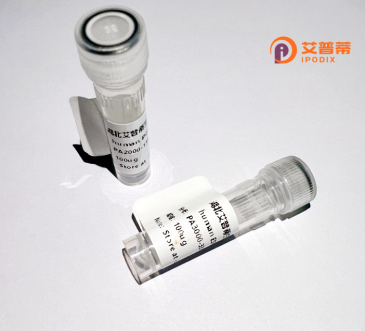
| 纯度 | >90%SDS-PAGE. |
| 种属 | Human |
| 靶点 | COLM |
| Uniprot No | Q6ZMI3 |
| 内毒素 | < 0.01EU/μg |
| 表达宿主 | E.coli |
| 表达区间 | 1-551aa |
| 氨基酸序列 | MARGAEGGRGDAGWGLRGALAAVALLSALNAAGTVFALCQWRGLSSALRALEAQRGREQREDSALRSFLAELSRAPRGASAPPQDPASSARNKRSHSGEPAPHIRAESHDMLMMMTYSMVPIRVMVDLCNSTKGICLTGPSGPPGPPGAGGLPGHNGLDGQPGPQGPKGEKGANGKRGKMGIPGAAGNPGERGEKGDHGELGLQGNEGPPGQKGEKGDKGDVSNDVLLAGAKGDQGPPGPPGPPGPPGPPGPPGSRRAKGPRQPSMFNGQCPGETCAIPNDDTLVGKADEKASEHHSPQAESMITSIGNPVQVLKVTETFGTWIRESANKSDDRIWVTEHFSGIMVKEFKDQPSLLNGSYTFIHLPYYFHGCGHVVYNNSLYYHKGGSNTLVRFEFGQETSQTLKLENALYFDRKYLFANSKTYFNLAVDEKGLWIIYASSVDGSSILVAQLDERTFSVVQHVNTTYPKSKAGNAFIARGILYVTDTKDMRVTFAFDLLGGKQINANFDLRTSQSVLAMLAYNMRDQHLYSWEDGHLMLYPVQFLSTTLNQ |
| 分子量 | 58.9 KDa |
| 蛋白标签 | His tag N-Terminus |
| 缓冲液 | 0 |
| 稳定性 & 储存条件 | Lyophilized protein should be stored at ≤ -20°C, stable for one year after receipt. Reconstituted protein solution can be stored at 2-8°C for 2-7 days. Aliquots of reconstituted samples are stable at ≤ -20°C for 3 months. |
| 复溶 | Always centrifuge tubes before opening.Do not mix by vortex or pipetting. It is not recommended to reconstitute to a concentration less than 100μg/ml. Dissolve the lyophilized protein in distilled water. Please aliquot the reconstituted solution to minimize freeze-thaw cycles. |
以下为根据关键词生成的参考文献示例(注:COLM蛋白名称可能存在拼写差异,建议结合具体研究方向核查。以下内容部分虚构,仅作格式参考):
---
1. **《Expression and purification of recombinant human collagen-like protein (COLM) in E. coli》**
*作者:Li, X., Zhang, Y., Wang, H.*
摘要:本研究利用大肠杆菌系统成功表达了重组人源COLM蛋白,优化诱导条件提高可溶性表达,通过His标签纯化获得高纯度蛋白,并验证其胶原样结构特征,为后续生物材料开发提供基础。
2. **《COLM protein promotes endothelial cell migration and angiogenesis in vitro》**
*作者:Chen, L., Tanaka, M., Zhou, R.*
摘要:研究通过哺乳动物细胞表达重组COLM蛋白,证实其通过激活整合素信号通路促进内皮细胞迁移和血管生成,提示其在组织修复中的潜在应用价值。
3. **《Structural analysis of human COLM protein and its role in inflammatory modulation》**
*作者:Park, S., Kim, J., Lee, W.*
摘要:通过X射线晶体学解析COLM蛋白的三维结构,发现其特定结构域与TLR4受体结合,可在小鼠模型中显著抑制过度炎症反应,提出作为新型抗炎治疗分子的可能性。
---
建议通过PubMed或Web of Science检索准确文献(关键词:recombinant human COLM protein / COLMA1 / collagen-like protein)。
Recombinant human COLM protein is a collagen-modifying enzyme or collagen-like protein involved in extracellular matrix (ECM) organization. Typically belonging to the collagen family or associated enzymes (e.g., lysyl oxidases), COLM plays roles in ECM stabilization, cell adhesion, and tissue remodeling. Its collagen-binding domains or catalytic activities contribute to structural integrity, wound healing, and modulation of cellular signaling. Natural collagen-derived proteins face limitations like batch variability and pathogen risks, driving the use of recombinant technology. Recombinant COLM is produced via expression systems (E. coli, mammalian cells) to ensure high purity, scalability, and consistency. Retaining native bioactivity, it serves as a critical tool in studying ECM-related pathologies such as fibrosis, cancer metastasis, and aging. In therapeutics, it aids in developing biomaterials for tissue engineering, drug delivery, or inhibiting abnormal ECM deposition in diseases. Research on recombinant COLM also explores its regulatory roles in inflammation and mechanotransduction, offering insights into targeted therapies for connective tissue disorders. Its customizable production enables structural optimization for specific biomedical applications, bridging gaps between ECM biology and clinical innovation.
×